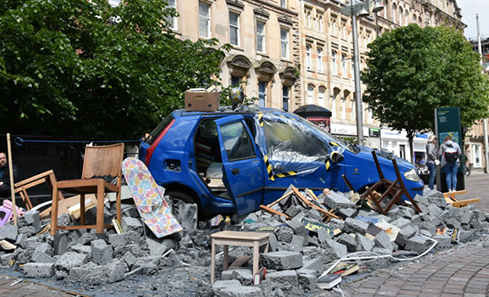Creative Scotland and Counterpoints Arts are working together to deliver the Mutual Affinities Learning Lab pilot programme for artists.
Led by Counterpoints Arts, the primary goal of the Mutual Affinities Learning Lab is to listen to artists in Scotland who have first-hand experience of displacement and enable them to sustain and develop their practice in dialogue with invited arts and community organisations located and working across Scotland.
Artists and organisations will be expected to participate in the Mutual Affinities Learning Lab programme over the course of 4.5 days between May and June 2022. The programme will be delivered in a hybrid format both online and in-person.

Rubble Theatre, Manaf Halbouni, St Enoch Square, Glasgow, Scottish Refugee Festival, Counterpoints Arts Production (Photo by Basharat Khan, 2019). Commissioned by Creative Scotland.
Artists will be supported to participate in the programme with a bursary of £1,250.
The Mutual Affinities Learning Lab will implement a ‘think and do’ collaborative approach. It will include creative workshops and group challenges, live case studies and mentoring. The aim is to deepen understanding of how to support artists with lived experience of displacement, enabling cultural organisations and artists to work together to mutual benefit.
The initiative is designed so that participants can learn and unlearn together, to imagine what progressive support structures for artists with lived experience of displacement might look like in practice and into the future. It will include contributions from international practitioners – artists, curators, activists and researchers - to stimulate ideas about local to global practices and new models of collaborative working. Please see below for more details about the programme and the range of visiting artists and facilitators.
The structure of the programme is outlined below:
The selection panel will comprise representatives from Counterpoints Arts, Deveron Projects, Creative Scotland plus artists with experience of displacement based in Scotland.
The selection criteria will consider:
The panel will select candidates against a balance of art forms, different stages in career, geographic spread and the potential benefit to the applicant.
Applicants who are not selected will be able to have a follow up conversation with an EDI team member at Creative Scotland.
Artists and organisations will be expected to participate in this Learning Lab programme on the dates noted above, with a commitment to do some small pieces of reflective work between sessions.
Applications closed on 26 April.
Invited candidates will be notified on Tuesday 3 May.
We can accept applications in video or audio format (including applications in BSL) for those with access needs.
We can also accept applications in a physical format for those without internet access.
If you have any questions regarding the programme and wish to discuss this further, please contact stuart.cameron@creativescotland.com
The Mutual Affinities Learning Lab is directed by Áine O’Brien, Curator of Learning and Research and Co-Founder, Counterpoints Arts, London, UK
The aim is to explore a range of interconnected areas related to challenges and opportunities emerging through the creative practice of artists who have experienced displacement and the work that organisations might do to support artists’ interests and ambitions.
The Mutual Affinities Learning Lab provides a unique opportunity for artists and organisations to collaborate in a dedicated learning programme – for artists to take this learning into their creative practice and for organisations to apply this learning to their everyday programming strategies/ways of working; and for artists and organisations to imagine together new projects and ways of working. The programme has been developed through a partnership between Creative Scotland and Counterpoints Arts, when in 2019 Counterpoints Arts led a discussion with representatives in the Scottish culture sector. The general consensus in 2019 was the need for a better understanding of how different cultural contexts, languages and employment patterns impact on an artist’s ability to sustain a career path; and on an organisation’s delivery frameworks and ability to engage with the richness and range of creative practices that are shaped by intergenerational histories of displacement and migration.
Rubble Theatre, Manaf Halbouni, St Enoch Square, Glasgow, Scottish Refugee Festival, Counterpoints Arts Production (Photo by Basharat Khan, 2019). Commissioned by Creative Scotland.
Halbouni’s work was commissioned to sit on the square in Glasgow in public view, with the artist and installation engaging in conversations with passersby. Halbouni’s cars (which have travelled across several cities in Europe) appear overloaded with personal possessions, resembling mobile living rooms, like ‘impossible houses’ offering moving tributes and testaments to loss, resilience and hope for displaced communities around the world.